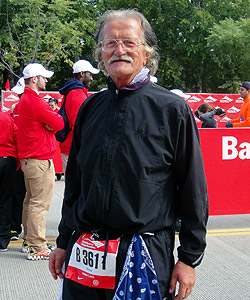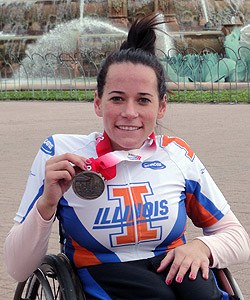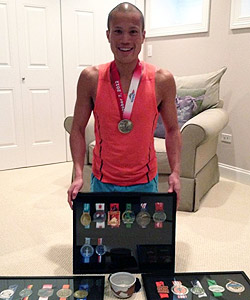 The 2012 Chicago Marathon celebrated its 35th anniversary on Sunday, with 45,000 runners participating. Here are three stories from race day.
The 2012 Chicago Marathon celebrated its 35th anniversary on Sunday, with 45,000 runners participating. Here are three stories from race day.As he’s continued to age, Joe Antonini has come to expect the same question each year: is he going to run the Chicago Marathon again?
Each year, Antonini’s answer has stayed the same.
“I tell people that I’m going to start it,” he said.
And Antonini has continued to finish them—all 35 Chicago Marathons, in fact.
Antonini knows this is not a given. For starters, he’s 72 years old and quick to admit he probably should have had a hip replacement three years ago. When he crossed the finish line on Sunday, he became one of eight Chicago area men to have run in every Chicago Marathon. He also walked with a noticeable limp. What’s most baffling is that Antonini has improved his time in each of the last three years, finishing this year in 6 hours, 41 minutes and 50 seconds—nearly a half hour faster from a year ago.
But this comes as no surprise to Antonini, a mustachioed, heavy accented Italian immigrant and retired mechanical engineer, who reasons that the improvement in time likely had to do with both the cool weather conditions and his weight loss; he dropped nine pounds from last year and is down to 180.
While he used to run sub-four hour marathons in his younger years, Antonini said he’s only ever run for fun. But he also thought his first marathon would be his last. Now, because of his age, he’s found it difficult to let go.
“Once you give up something, there’s no going back,” said Antonini, who lives near University Village. “If it hurts I slow down, and then I slow down more. I learned from other things that giving up on something isn’t always the best thing. Luck plays quite a role in this situation, of course.”
Antonini’s first love has always been soccer. He played semi-professional soccer in Chicago until he was 38 and has refereed high school games ever since. For Antonini, soccer will always come before running. When he’s not officiating games he likes to run seven to ten miles along Lake Michigan. The long-distance running is still a huge psychological and physical release—he calls it getting all the poisons out—and the Chicago Marathon itself has allowed him to see the city evolve over the last three decades.
“The more I run the marathon, the course is always the same, but it always seems like I see some new buildings or see how the city has modernized,” Antonini said. “So I actually enjoy it.”
Antonini also takes pleasure in the crowd support and clever signs he’s come across. Two handmade signs in particular stood out to Antonini on Sunday. The first one read: “Someday You Will Not Be Able To Do This.” Right next to it, the second sign read: “Today Is Not That Day.”
Photograph: Chris Silva
 Kelsey LeFevour wheeled across the finish line to a rousing ovation and with no other racer in sight. She glided past a throng of well-wishers and to a tent near Buckingham Fountain. Lifting herself out of her racing chair and into her regular wheelchair, she began to ask how the rest of her teammates had fared. For LeFevour, this year’s Chicago Marathon was as much a team thing as it was a personal goal.
Kelsey LeFevour wheeled across the finish line to a rousing ovation and with no other racer in sight. She glided past a throng of well-wishers and to a tent near Buckingham Fountain. Lifting herself out of her racing chair and into her regular wheelchair, she began to ask how the rest of her teammates had fared. For LeFevour, this year’s Chicago Marathon was as much a team thing as it was a personal goal.
LeFevour, a Chicago native and graduate student at the University of Illinois, is a member of the Fighting Illini’s wheelchair track team, one of the best in the nation. The contingent dominated the field: LeFevour placed third in the six-person women’s wheelchair division, which was made up of past and present Illini.
“The first (marathon) for me was very much: just get through it,” said LeFevour, who was born with scoliosis. “I definitely wasn’t at the point where I had been racing long enough to have really enjoyed it. It’s a lot of work. So I wanted to do it again so I could have the experience of having one under your belt and having more years of training."
LeFevour said the race was still an intimidating experience. In the world of wheelchair racing, she was surrounded by greatness on Sunday: Tatyana McFadden, the three-time gold medalist at the 2012 Paralympics, won her third race in four years, while Susannah Scaroni, another Paralympian, finished second. Meanwhile, the men’s field included Illini Ray Martin, the Paralympic SportsMan of the Year.
LeFevour completed Sunday’s marathon in 2 hours, 20 minutes, 2 seconds, nearly 14 minutes better than her first marathon in 2009.
The Illini wheelchair track team sends a group to several marathons across the country each year, but LeFevour, who specializes in short distance racing, hasn’t ventured outside the Chicago Marathon. At 23, she’s still relatively new to the sport and didn’t get into racing until her freshman year five years ago. Just about all of her Illini teammates have been racing competitively since they about 10, according to Illini head coach Adam Bleakney.
“It takes training volume and there’s a minimum amount of volume you have to put in before you’re able to achieve those elite performances,” Bleakney said. “For the limited amount of time Kelsey’s been in racing she’s shown marked improvement and progress.”
For LeFevour, the marathon was also an opportunity to revisit her hometown. "The city’s great, the culture’s so cool," she said. "You’re seeing the city from a different perspective. It’s one of my favorite Sundays in Chicago.”
Photograph: Chris Silva
 David Coligado runs marathons to raise money for charity and to help others take the first step in long-distance running. But above all, the Bucktown resident runs to hold himself accountable.
David Coligado runs marathons to raise money for charity and to help others take the first step in long-distance running. But above all, the Bucktown resident runs to hold himself accountable.
It was only 10 years ago that the 34-year-old Coligado weighed more than 300 pounds with 40 percent body fat, smoked a pack and a half of Marlboro Reds a day, and lived off fast food. He knew nothing of accountability. A life-changing moment that occurred on the third floor of his apartment building stairwell—when he was so winded from the brief walk that he needed to take a smoke break—provided a mental snapshot that served as motivation to change.
A decade later—including 26 marathons and six ultra-marathons in the last four years—Coligado looks and acts nothing like his old self. After raising money for the Lance Armstrong Foundation his first two Chicago Marathons, in honor of his father who died of brain cancer, Coligado ran Sunday’s marathon as a pace setter for a local Lululemon running group he’s been working with.
“Everyone hit a [personal record], which made the past five months worth it,” Coligado said. “That, for me, is why I love this race.”
Meanwhile, Coligado finished in 3 hours, 50 minutes and 44 seconds—and is already signed up for next May’s Outer Banks Ultramarathon in North Carolina. His brother, Darwin, raced in the wheelchair division, and his sister, Deborah, ran the marathon on Sunday.
Long-distance running is an active meditation for Coligado, who is on the road for more than 100 days a year as a cloud architect for Dell. He didn’t start running until 2006, which was three years after his epiphany. Coligado said that not a day goes by in which he doesn’t think about how far he’s come—and how it’s something he has to continue to work at to keep going.
“There’s days when you’ll put in a 12-, 14-hour day, get to sleep at 10 o’clock, 12 o’clock at night, and know you’ve got the same kind of day tomorrow—but you just know [running] is not something you can put off,” he said. “It’s a real slippery slope. If you don’t hold yourself accountable for one day, you’re not going to hold yourself accountable for a week—then a month, and before you know it…”
Coligado didn’t finish his sentence. He’s already familiar with that outcome.
Photograph: Chris Silva


